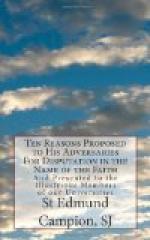But, doubtless, necessity is a hard weapon. Pardon
these subterfuges. Throughout the whole course
of fifteen centuries these men find neither town, village
nor household professing their doctrine, until an unhappy
monk by an incestuous marriage had deflowered a virgin
vowed to God, or a Swiss gladiator had conspired against
his country, or a branded runaway had occupied Geneva.
These people, if they want to have a Church at all,
are compelled to crack up a Church all hidden away;
and to claim parents whom they themselves have never
known, and no mortal has ever set eyes on, Perhaps
they glory in the ancestry of men whom every one knows
to have been heretics, such as Aerius, Jovinianus,
Vigilantius, Helvidius, Berengarius, the Waldenses,
the Lollards, Wycliffe, Huss, of whom they have begged
sundry poisonous fragments of dogmas. Wonder
not that I have no fear of their empty talk: once
I can meet them in the noon-day, I shall have no trouble
in dispelling such vapourings. Our conversation
with them would take this line. Tell me, do you
subscribe to the Church which flourished in bygone
ages? Certainly. Let us traverse, then, different
countries and periods. What Church? The assembly
of the faithful. What faithful? Their names
are unknown, but it is certain that there have been
many of them. Certain? to whom is it certain?
To God Who says so! We, who have been taught of
God—stuff and nonsense, how am I to believe
it? If you had the fire of faith in you, you
would know it as well as you know you are alive.
Let in as spectators, could you withhold your laughter?
To think that all Christians should be bidden to join
the Church; to beware of being cut down by the spiritual
sword; to keep peace in the house of God; to trust
their soul to the Church as to the pillar of truth;
to lay all their complaints before the Church; to
hold for heathen all who are cast out of the Church;
and that nevertheless so many men for so many centuries
should not know where the Church is or who belong to
it! This much only they prate in the darkness,
that wherever the Church is, only Saints and persons
destined for heaven are contained in it. Hence
it follows that whoever wishes to withdraw himself
from the authority of his ecclesiastical superior
has only to persuade himself that the priest has fallen
into sin and is quite cut off from the Church.
Knowing as I did that the adversaries were inventing
these fictions, contrary to the customary sense of
the Churches in all ages, and that, having lost the
whole substance, they still wished in their difficulties
to retain the name, I took comfort in the thought
of your sagacity, and so promised myself that, as soon
as ever you had cognisance of such artifices by their
own confession, you would at once like men of mark
and intelligence rend asunder the web of foolish sophistry
woven for your undoing.
FOURTH REASON
COUNCILS




